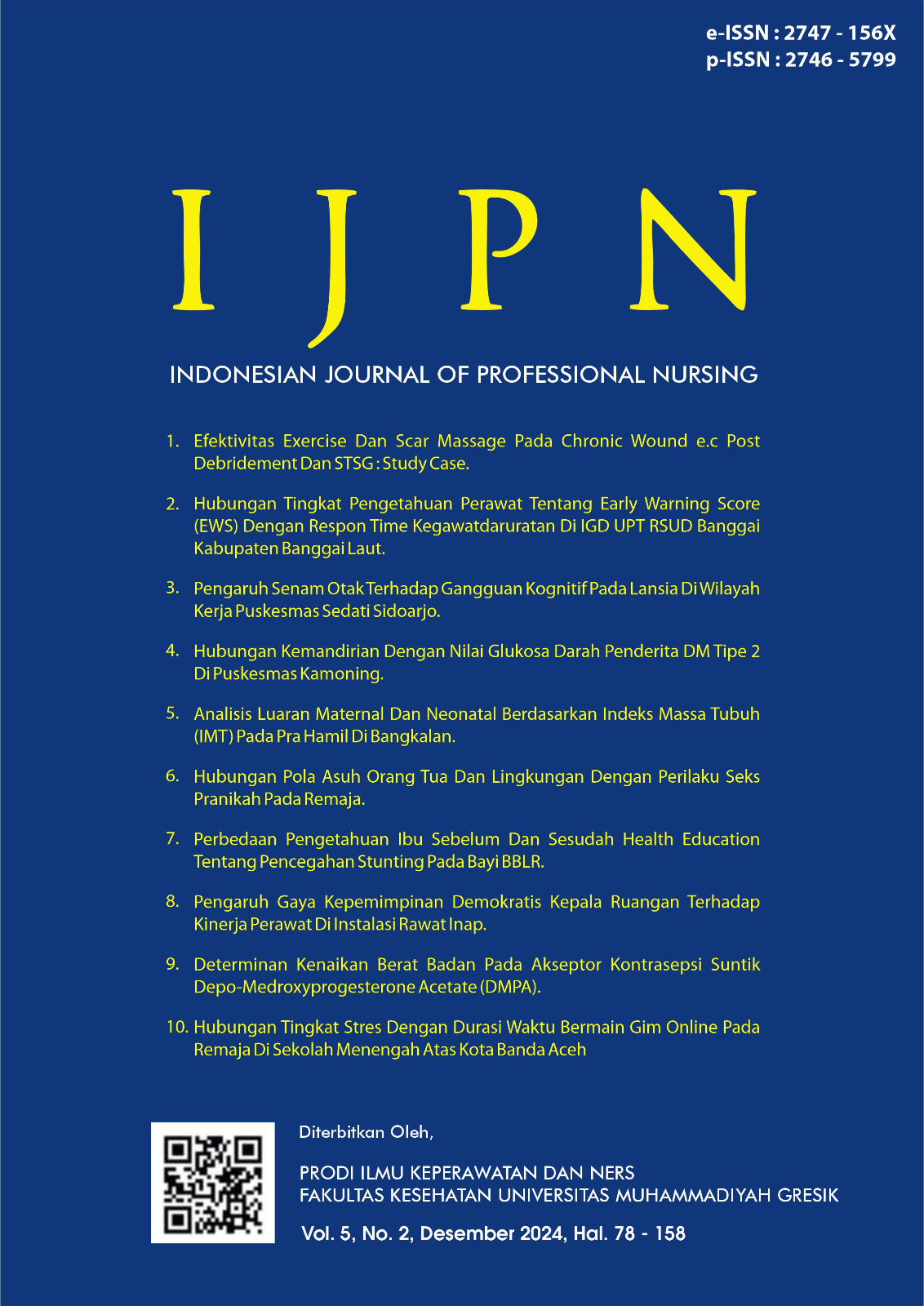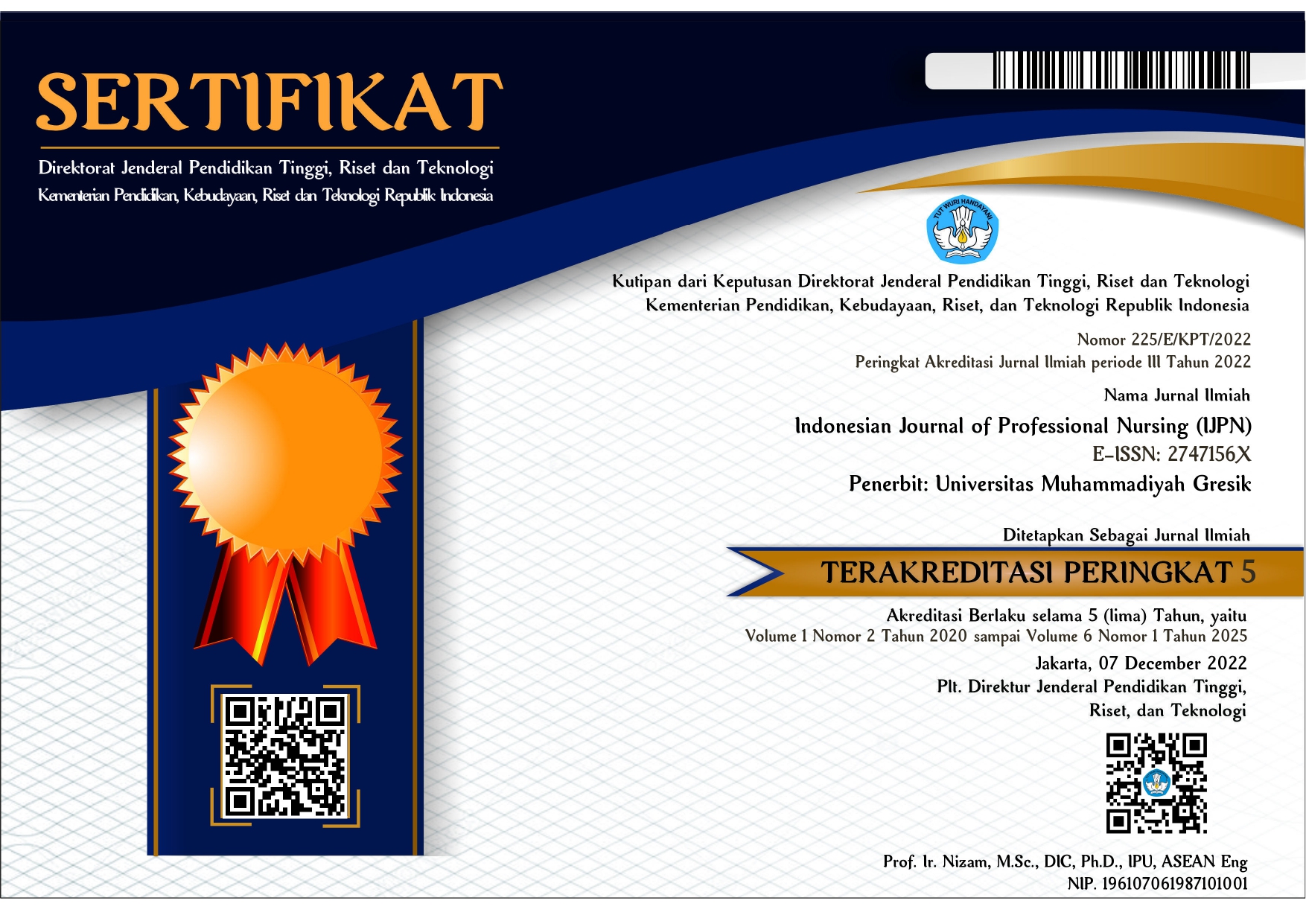Analisis Luaran Maternal Dan Neonatal Berdasarkan Indeks Massa Tubuh (IMT) Pada Pra Hamil Di Bangkalan
DOI:
https://doi.org/10.30587/ijpn.v5i2.8706Keywords:
BMI, body weight, maternal outcomes, perinatal outcomesAbstract
Pregnancy is a crucial period in a woman's life. Although it is a physiological process, pregnancy carries certain warning signs and complications that can threaten the health of both mother and baby. Nutritional issues experienced by a woman before and during the early stages of pregnancy can significantly impact the quality of the pregnancy and the subsequent stages of life. This study aims to analyze maternal and perinatal outcomes based on pre-pregnancy BMI.
This research employs an analytic design with a retrospective approach. The study’s variables include the independent variable of pre-pregnancy BMI, while the dependent variables are maternal outcomes (gestational age at delivery) and perinatal outcomes, including low birth weight and asphyxia. The population for this study consisted of women who gave birth in Bangkalan Regency. The sampling technique used was probability sampling, specifically purposive sampling.
The statistical test using Spearman Rank showed a p-value of 0.802 (>0.05), indicating no correlation between pre-pregnancy BMI and gestational age at delivery. A p-value of 0.277 (>0.05) indicated no significant relationship between pre-pregnancy BMI and birth weight. However, a p-value of 0.005 (<0.05) and a correlation coefficient of 0.287 indicated a weak correlation between pre-pregnancy BMI and asphyxia/Apgar score.
It is essential for pregnant women to monitor their weight gain during pregnancy to align with recommended guidelines.
References
Bone, J. N., Joseph, K. S., Mayer, C., Platt, R., & Sarka Lisonkova. (2022). The association between pre-pregnancy body mass index and perinatal death and the role of gestational age at delivery. 17(3). https://doi.org/10.1371/journal.pone.0264565
Calbara, O. A., & Budiono, D. I. (2023). Pengaruh Aktivitas Fisik Selama Kehamilan dan Luaran Kehamilan: Literatur Revie. 23, 1142–1146. doi:10.33087/jiubj.v23i2.3435
Ciptaningtyas, F., Irwanto, Fatmaningrum, W., & Univeritas Airlangga. (n.d.). Pre-Pregnancy Body Mass Index and Gestational Weight Gainas Risk Factors for lowB Birth Weight. 15(02), 176–183.
Damalita, A. F. (2022). Pengaruh Kenaikan Berat Badan Ibu Hamil Terhadap Kelahiran Prematur: Meta-Analisis.
Ehrenberg, H. M., Dierker, L., Miluzzi, C., & Brian M Mercer. (2003). Low Maternal Weight, failure to thrive in pregnancy, and adverse pregnancy outcomes. American Journal of Obstetrics and Gynecology, 189(6), 1726–1730.
Heude, B., Thiebaugeorges, O., Goua, V., Forhan, A., Kaminski, M., Foliguet, B., Schweitzer, M., Magnin, G., & Marie-Aline Charles. (2012). No TitlePre-pregnancy body mass index and weight gain during pregnancy: relations with gestational diabetes and hypertension, and brith outcomes. 16(2), 355–363.
Kemenkes RI. (2023). LAKIP GIKIA TA 2023.
KemenkesRI. (2023). PETUNJUK TEKNIS Pemberian Makanan Tambahan (PMT) Berbahan Pangan Lokal untuk Balita dan Ibu Hamil 2023.
Liu, L., Ma, Y., Wang, N., Lin, W., Liu, Y., & deliang wen. (2019). Maternal body mass index and risk of neonatal adverse outcomes in China: a Systematic review and meta-analysis. 19, 1–12.
Mohapatra, I., Harshini, N., Samantaray, S. R., & Gitisnita Naik. (2022). Association Between Early Pregnancy Body Mass Index and Gestational Weight Gain in Relation to Neonatal Birth Weight. 14(7).
Murata, T., & Kyozuka, H. (2021). Maternal Pre-pregnancy body mass index and foetal acidosis in vaginal and caesaren deliveries: The Japan Environment and Children’s Study. 11(1).
Nowak, M., Kalwa, M., Leksy, P., Marszalek, K., Radon-Pokracka, M., & Hubert Huras. (2019). The Relationship between pre-pregnancy BMI, gestational weight gain and neonatal birth weight: a retrospective cohort study. 90(1), 50–54.
Nurhayati, E., & Sandra Fikawati. (2016). Indeks Massa Tubuh (IMT) Pra Hamil dan Kenaikan Berat Badan Ibu Selama Hamil Berhubungan dengan Berat Badan Bayi Lahir. Jurnal Ners Dan Kebidanan, 4(1), 1–5.
Nurhayati, N. (2018). Hubungan Preeklamsia Dengan Kejadian Persalinan Preterm di Rumah Sakit Umum Kabupaten Tangerang. Jurnal Kesehatan, 12(2), 1–4. https://doi.org/10.36082/qjk.v12i2.38
Persson, M., Johansson, S., Villamor, E., & Cnalttinguis, S. (2014). Maternal Overweight and obesity and risks of severe brith-asphyxia-related complications in term infants: a population-based cohort study in Sweden. 11(5).
Qomari, S. N., Umiyah, A., Nikmah, N., & Stikes Ngudia Husada Madura. (2022). Analisis Korelasi Indeks Massa Tubuh dan Kadar HB pada Ibu Bersalin Pre Ekampsia terhadap Asfiksia Neonatrum. Jurnal Ilmu Kesehatan, 6(1), 94–101.
Quedarusman, H., Wantania, J., Kaeng, J. J., & Unsrat Manado. (2013). Hubungan Indeks Massa Tubuh (IMT) dan Peningkatan Berat Badan Saat Kehamilan dengan Preklampsia. Jurnal Beomedik, 1(1), 305–311.
Riantika, Y., Sanjaya, R., Fara, Y. D., & Universitas Aisyah Pringsewu. (2022). Hubungan Indeks Massa Tubuh (IMT) Ibu hamil dengan berat badan lahir rendah: studi kolerasi di dua puskesmas di wilyah kabupaten pesawaran lampung. 3(1), 7–12.
Sumiaty, & Sri Restu. (2016). Kurang Energi Kronis (KEK) Ibu Hamil Dengan Bayi Berat Lahir Rendah (BBLR). Jurnal Husada Mahakam, 4(3), 162–170.










